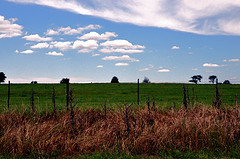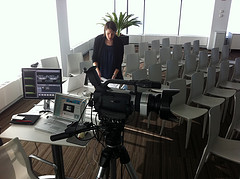Online Outreach to Private Landowners and Resource Managers
By: Amos S. Eno
Posted on:03/31/2011Internet training is here and promises only to grow. The Texas Agrilife Extension Service sets an excellent example.
Imagine a training session for 210 people with presenters from North Carolina and Texas, where everyone is back at their office in time for lunch. This is the extension service of the future.
Dr. Eric Taylor, Associate Professor and Extension Specialist with The Ecosystem Science and Management Unit of Texas AgriLife Extension Service, is an Internet outreach rock star. “Currently, most of our outreach is to certain core individuals,” he says, “but our agency is encouraging the use of Information Technology to not only reach traditional audiences more efficiently, but also to reach a larger number of people we don’t currently serve.
is an Internet outreach rock star. “Currently, most of our outreach is to certain core individuals,” he says, “but our agency is encouraging the use of Information Technology to not only reach traditional audiences more efficiently, but also to reach a larger number of people we don’t currently serve.
“Partnerships with Resources First Foundation private landowner websites are precisely the type of outreach that we and other Extension groups throughout the country are trying to establish.”
From Tech Savvy to Online Training Guru
“I’ve always been savvy in the use of technology,” Eric says. “When I first began working for Extension, I spent a  lot of time running around giving talks to a handful of people. I’d spend a great deal of time developing presentations that I gave a handful of times, only to have them sit inside my computer for no one to ever see again. I thought there’s got to be a better way to get more bang for our buck.
lot of time running around giving talks to a handful of people. I’d spend a great deal of time developing presentations that I gave a handful of times, only to have them sit inside my computer for no one to ever see again. I thought there’s got to be a better way to get more bang for our buck.
“This was about 14 years ago, when many of the Internet-based communication tools available today were still unheard of. I began looking for ways to record our outreach events. For example, if I had to drive two hours to Jasper to give a program on forest herbicides to 30 people, I could easily take along the equipment necessary to record the presentation. By spending about 5% more effort, I was able to make the material available indefinitely to a much larger audience through the Internet.
“Next, I received some grant funds to build a forestry continuing education website. Now here we are working on the finishing touches to our updated site entitled Continuing Forestry Education Group. We intend to disseminate information to landowners as efficiently as possible, on demand, at the times that work for them. We can provide continuing education unit (CEU) training online and charge by the hour at a very reasonable cost. We also can make shorter segments from our webinars available on YouTube.”
Virtual Resource Management Training - Live
“Here’s a typical example of how we like t o work,” Eric continues. “We set up a program with a live audience. The software program Wirecast allows us to record and edit the program using a production computer in tandem with our presentation computer. This allows us to record the presenter side by side with the material he or she is presenting, adding subtitles and backgrounds, just like a broadcast studio. We can choose to webcast the presentation in real time and/or record it for later download for a fee.
o work,” Eric continues. “We set up a program with a live audience. The software program Wirecast allows us to record and edit the program using a production computer in tandem with our presentation computer. This allows us to record the presenter side by side with the material he or she is presenting, adding subtitles and backgrounds, just like a broadcast studio. We can choose to webcast the presentation in real time and/or record it for later download for a fee.
“The advantage of this method is that our online audience gets to see and hear the presenter’s interactions with a live audience. We have found through surveys that this is most important for adding satisfaction to participants. We are working with a number of partners in this effort. We also help to develop free webinars available through forestrywebinars.net.”
When I first began corresponding with Eric, he convinced me to download and use Skype to talk, mainly because he does not have a long distance telephone budget! He also uses Skype and iChat (he has a Mac, of course) for conferencing, sharing documents, sharing computer desktops, and collaboration. “For example, if I am writing a fact sheet with co-authors, we can edit it online together in real time, and the document becomes much stronger that way.
“One of the most important lessons I’ve learned is, quality, quality, quality! I like to really know the person that I’m inviting to make a presentation because we need energetic speakers who can engage participants through a computer. I’ve also developed an MOU for my presenters, which lays out their responsibilities. In general, I’ve found that, along with audience interaction, it’s best to present quality content, but not take it too seriously. A little humor works wonders.
“Anyone who is starting to do this should also try to work with someone who has experience. Don’t learn all your lessons the hard way!
“Our ultimate goal is to establish communities who work together to provide science based peer-reviewed information on topics of interest, from forestry taxes to horse care to biofuels.” Eric is well on his way, and at our end, the Resources First Foundation is working to put landowners in touch with innovative information sources such as Eric’s.
 Sign In
Sign In
 Sign In
Sign In
